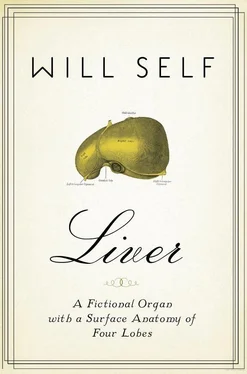God, then — he would stop her from falling; God and the pure sounds of uncorrupted humanity.
Until the end of January, when she had felt too ill to continue, Joyce had been one of the Bournville Singers, who were rehearsing Mozart’s Requiem in the canteen of the Institute. No one — including their insufferably vain director, Tom Scoresby — could have claimed that their performance was going to be either the most faithful or the most sonorous; yet, even with serving hatches for a backdrop, they had soared.
Requiem aeternam dona ets, Domine . Dumpy men in open-neck shirts — some former car workers, others retired middle-class professionals — their chests heaving; then Joyce and the other women panting up the scale: et lux perpetua luceat ets. She tried not to see Scoresby, his quaver of silver-blond hair bouncing as he whipped up his singers, but instead focused on those beautiful streamers of sound, chords looped over clouds so that the angels might haul her up. Grant them eternal rest, O Lord, and may perpetual light shine on them .
It was so stupid to have got on this flight; and cretinous not to have appreciated everything before she left — the row of storage jars on the kitchen shelf, rice, pearl barley, flour, sugar — but taken all that wondrously dispassionate order for granted.
If I ever get down from this sky I won’t be making that mistake again, oh, no.
The plane surfaced in a sea of cloudy islands, then broke through into unearthly sunlight. Relief rippled audibly along the fuselage. The stewardess unbuckled her harness and stood, swaying, straightening her skirt.
‘Water, Mum?’ Isobel asked again, her plump features stuffed with the gutta-percha of concern.
The immediate anxiety fell away from Joyce, a dark plume dispelled, leaving the black truth behind: the nausea, the wire, the distension, the lassitude. How mad, how mindlessly bloody insane to care if I die now, when in a matter of hours I definitely will .
The rest of the flight was uneventful. There was no question of Joyce accepting the white roll filled with cheesy sludge — an alcoholic drink was unthinkable. The stewardess — maybe she knows — kept hauling herself along the plane to ask, ‘Is it. your mother? Is she OK, yes?’ Then she and Isobel — both of them, Joyce thought, a little bovine — would low: ‘Would you like some water?’
Water! Joyce was pretty sure she’d wet herself on take-off. When they left the house, and she had locked the door for the last time and handed the keys to Isobel, Joyce was gripped by an unworthy rage. What will she do with the good drapes and the seat covers? Her father’s LPs and the Venetian glass? She saw it all — despite her meticulous instructions — dumped in cardboard boxes outside the Sue Ryder shop in Shirley.
By the time Joyce got a grip on herself, they were in the cab heading for the airport — and it was too late to go back for the incontinence pads. And now, well, there must be a dark patch on the pale blue airline upholstery. Shameful .
The plane, moaning, hunkered down towards the ground. Wooded hills, bare fields, arterial roads flowing between the metal barns of light industry. The housing was as samey as that which they had left behind. There was no sign of the Matterhorn — or grassy Alps. No snow — but this was March — or cuckoo clocks, or chalets with wide wooden eaves, or Heidi running with the goats, or chocolate bars stacked like lumber. The only clichés were the airport, the runway, the plane braking to a halt, the co-pilot announcing: ‘Welcome to Zürich, ladies and gentlemen, where the local time is 11.48. I hope you enjoyed your flight with us today, and on behalf of the crew I’d like to wish you a safe onward journey.’
Joyce, who had always been a tall woman — a rangy woman, Derry’s expression, and she had liked it from him — couldn’t extract herself from the window seat without Isobel pulling, and the stewardess, who had slid into the seat behind, pushing.
A moment before she got up, with a colossal effort, Joyce lifted her behind and slid the paper napkin beneath it. Fleetingly, she had a touching faith in the napkin’s absorbency, but when she looked back there was an obvious pool of urine. The stewardess must have seen it, but she was tactful — a Swiss characteristic, Joyce supposed — and offered to help Joyce on with her coat, indicating that she understood the need to hide the spreading stain on the back of Joyce’s skirt.
Dr Phillimore — whom Joyce had first met when he arrived at Mid-East, a year before she retired — had known full well why she wanted a letter setting out the details of her cancer, its likely progression and definite prognosis. Although she had no great respect for him as a practitioner — Phillimore’s manner was brusque and self-satisfied — at first Joyce was merely grateful that he didn’t try to dissuade her; this implied that, despite the scant attention he had paid her when he could have been expected to keep her alive, now she had stoically chosen death he would aid her in the Ancient way.
So, no mention of the excellent palliative care team — which anyway would have been an arrant falsehood. Although Joyce hadn’t had a direct hand in the hospital’s administration for a decade now, she kept in touch with old colleagues at Mid-East and knew the threadbare condition of these things. Nor did Phillimore remind her of the many hospices with which the hospital had good working relations; nor yet still did he speak of the tremendous advances in pain management, which would allow Joyce the lucid repose of a Socrates up until she breathed her last.
It was only as Joyce shuffled off down the corridor — grateful for the handrail that she herself had arranged to have installed — that it occurred to her that Phillimore, far from being disengaged, might actively support her decision: not for philosophic reasons, but only because her removal would lighten his own caseload, enabling him — a plump arrow with white coat fletching — to stay within the concentric rings of his allocated budget and hit his targets.
Isobel insinuated under one arm, the stewardess tucked under the other, Joyce scraped her ankle boots over the concrete pan to the shuttle bus. Inside it black-clad businessmen and women urgently gripped their mobile phones. Ignoring their impatience and the damp chafing of her own underwear, Joyce paused, savouring the mineral tang of aviation fuel, the beat of heat and the echoey howl from taxiing aircraft. She looked back at the plane that had brought her, shackled now by gravity. On its tailfin the stocky white-out-of-red cross glowed: it was the opposite of an air ambulance, Joyce thought, bringing her here with great dispatch so that she might be lost, not saved.
Lord have mercy upon numbered bank accounts, neutrality and Nazi gold. Joyce shivered in the shiny arrivals hall, then shook as they shuffled along the shushed shopping concourse. She had no option but — Christe eleison — to allow her daughter to get on with it . Of course, they had taken only carry-on. Joyce may have been intending to stay for ever, but she could make do without a change of shroud; while Isobel would be flying home the following day.
Be that as it may, with her mother to tote, Isobel had to find a luggage cart and ask for directions — tasks she performed, in Joyce’s eyes, poorly. Her daughter was at once loud and ineffectual; she moved with a mock-triumphant roll of her wide hips. Her outfit of high-heeled boots, tight jeans and cropped leather jacket seemed designed to emphasize how overweight she was. She had — Joyce thought, not for the first time — her father’s bullishness but none of his charm.
Читать дальше












